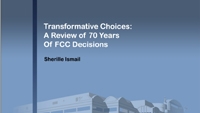New FCC research paper series aims to build ‘intellectual capital’

A new research paper released last week by the FCC provides a historical examination of key commission decisions that have determined the state of communications in the United States.
The paper, “Transformative Choices: A Review of 70 Years of FCC Decisions” by Sherille Ismail, a senior attorney in the Office of Strategic Planning and Policy Analysis (OSP), summarizes the appearance of new communications technology, the key stakeholders in the technology, their concerns and perspectives, as well as development of commission policy to deal with the emerging technologies.
For example, regarding broadcast television, the author summarizes critical historical FCC actions, such as the commission’s decision to move FM radio up the VHF band in 1945 to make way for 12 channels (2 through 13) and the 1952 FCC decision to add 70 UHF channels for commercial and non-commercial TV.
In terms of key stakeholders, the paper explains their concerns and the commission’s response. For instance, Ismail recounts that radio pioneer Edwin Armstrong and others wished to maintain and expand their FM channels in the 42MHz to 50MHz band, while RCA and other commercial TV networks sought to use the VHF band for television.
Similarly, Ismail tackles several topics in the paper, including: radio, broadcast television, cable television, Carterfone, direct-broadcast satellite television, digital cell phones and high-definition television.
Ismail’s paper is one of two the commission released last week. The other, “Maximum Impact for Minimum Subsidy: Reverse Auctions for Universal Access in Chile and India,” is written by Irene Wu, acting chief data officer for the International Bureau.
In announcing the release of the research papers, the commission said the new FCC Staff Working Papers replace all earlier working paper series released by individual bureaus and offices. The papers are “intended to encourage staff research that furthers the ‘expert’ function of the agency and builds agency intellectual capital,” the announcement said.
The professional video industry's #1 source for news, trends and product and tech information. Sign up below.
